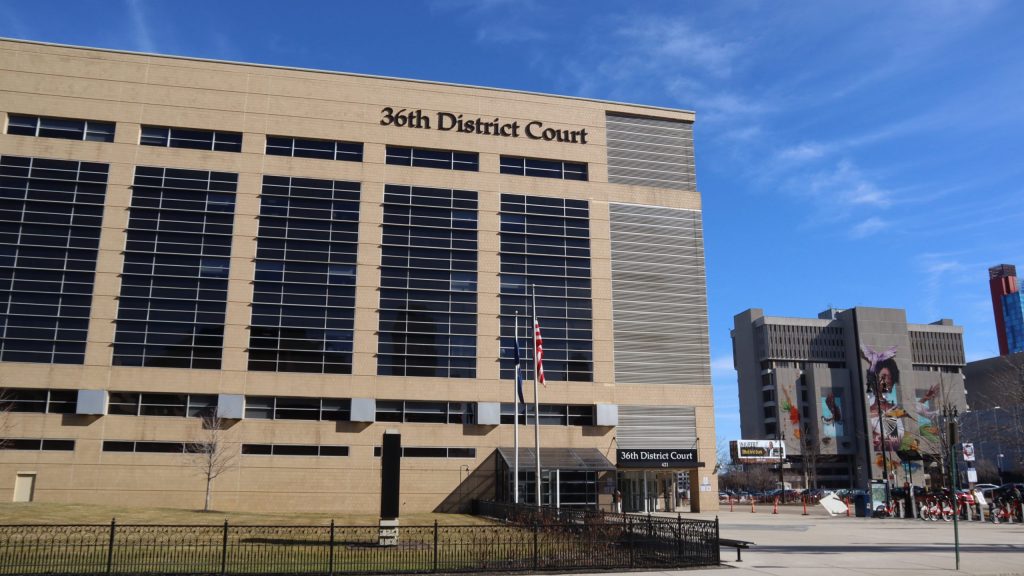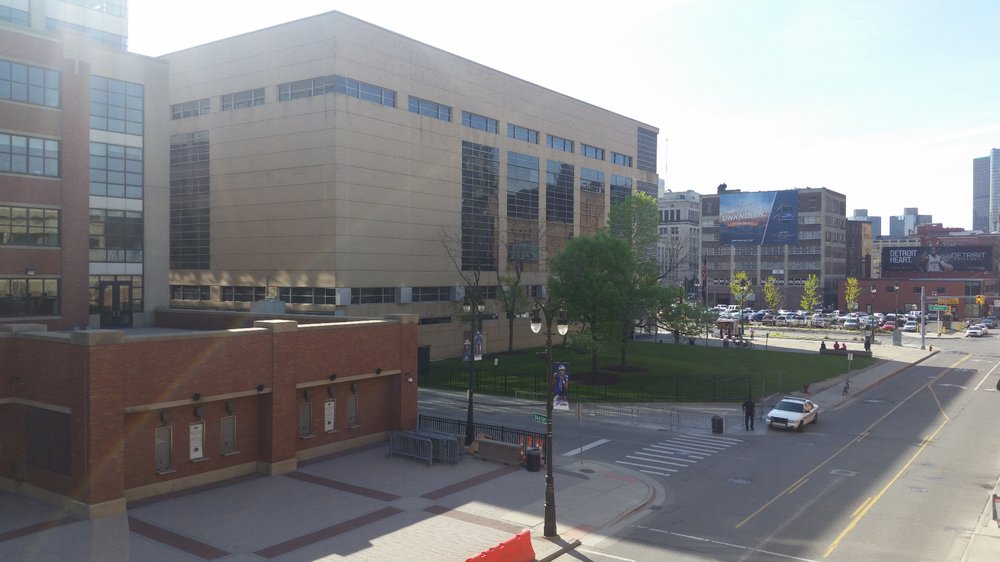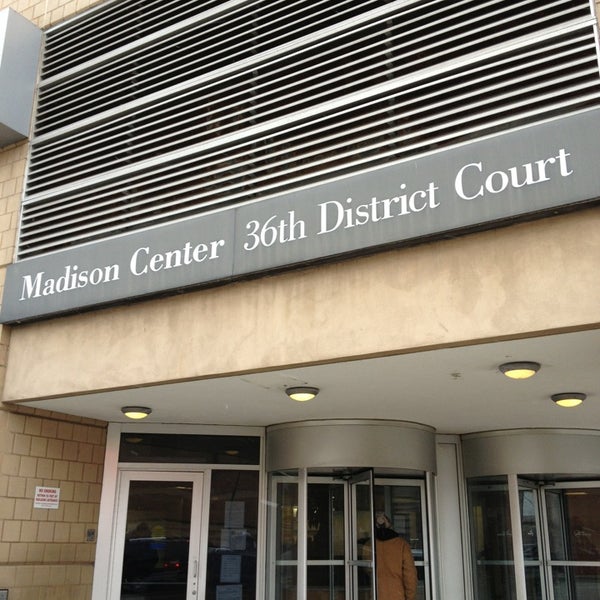36th District Court - Your Guide To Court Services
When you need to find out about a case or court schedule, the 36th District Court offers a handy way to look up information. This system, which is a public resource, lets people check on things like a case's history or when a hearing is set to happen. It's really there to help folks get the details they might need about various court matters.
This resource, you know, makes it simpler for anyone to see important records. It's all about providing open access to what's called a "register of actions," which is basically a permanent record of what has gone on with a case. This means you can get a picture of the important steps and dates connected to different legal situations.
So, whether you are wondering about civil disagreements, traffic violations, criminal charges, family matters, or even probate issues, this court system has ways for you to look up what's happening. It’s designed to help you find the details you are seeking, making court information more reachable for everyone in Michigan.
Table of Contents
- What Can You Find at the 36th District Court?
- How Does the 36th District Court Keep Things Fair?
- What Happens in a Criminal Case at the 36th District Court?
- How Does the 36th District Court Help People Get Information?
What Can You Find at the 36th District Court?
When you are looking for information about a court matter, it's pretty helpful to know where to begin. The 36th District Court has a system that allows people to get a peek at case details. This means you can see what has happened in a particular case, or when it's scheduled to come before a judge. It's a way, you know, for the public to stay informed about what goes on in the court system, making things more open for everyone who needs to know.
The main idea behind this system is to make court records available to the public. These records, often called a "register of actions," hold the full story of a case from start to finish. They contain really important information about every step taken in a legal matter, so you can track its progress. This includes everything from the initial filing to any final decisions. It's a good way, you know, to keep track of legal happenings.
Exploring the 36th District Court's Case Inquiry System
The 36th District Court has set up a way for people to look into court cases. This "case inquiry system" is a digital tool, you know, that makes it easier to find records. It's designed so that if you have a name or a case number, you can put it into the system and see what comes up. This means you do not always have to go down to the courthouse just to ask a simple question about a case's status.
When you use this system, you are essentially looking at a permanent record of a case. This record, often called a register of actions, holds all the important information related to that particular matter. It is a complete history, showing every official step and decision. So, for example, you can see when documents were filed, when hearings were scheduled, or when a judge made a ruling. It's quite useful, really, for anyone needing to keep tabs on legal proceedings.
The system also lets you check the court's schedule. This is pretty handy if you need to know when a specific case is set for a hearing or trial. You can look up dates and times, which helps people plan if they need to attend or just want to follow along. It's all about making court operations a bit more clear and accessible for the community. You can, for instance, find out about virtual court appearances too, which have their own set of rules.
Different Types of Cases at the 36th District Court
The 36th District Court handles a wide range of legal matters, covering many different situations people might face. You can, for example, look up cases related to disagreements between people or businesses, which are called civil cases. These might involve things like contract disputes or personal injuries. It's a place where individuals can try to settle their differences with legal guidance.
Then there are traffic cases, which are probably pretty common. These deal with tickets and violations on the road. So, if you got a speeding ticket or had a minor accident, that kind of matter would likely be handled here. It's where you would go to address those sorts of legal issues, you know, that come up from driving.
The court also deals with criminal cases. These involve situations where someone is accused of breaking the law. This includes both smaller offenses, known as misdemeanors, and more serious ones, which are felonies. The court has a role in managing these cases from the very beginning stages. It's a significant part, actually, of what the court does for public safety.
Family-related legal issues, often called domestic cases, are also part of the court's work. These can involve things like family disputes or protective orders. They deal with sensitive personal matters that require legal attention. It's a place where people can seek legal help for situations within their own households, providing a way to resolve difficult personal circumstances.
Finally, the court handles probate cases. These are matters that typically involve wills, estates, and guardianships. So, if someone has passed away and their property needs to be distributed, or if someone needs a legal guardian, these kinds of cases would come before the court. It's a way, you know, to make sure that people's wishes are followed and vulnerable individuals are cared for legally.
How Does the 36th District Court Keep Things Fair?
Keeping things fair and orderly is a big part of what the 36th District Court aims to do. This means having clear rules for how things operate, both inside the physical courthouse and during online appearances. These rules are put in place, you know, to make sure everyone is treated with respect and that legal processes can happen smoothly without interruptions. It's all about maintaining a proper atmosphere for serious legal matters.
The court also takes steps to ensure that all financial dealings are honest. They have strict policies about payments and take any attempts at dishonesty very seriously. This commitment to honesty helps protect everyone involved and makes sure that the court's operations are trustworthy. It’s a way, in some respects, to uphold the integrity of the entire system for the community.
Rules for Visiting the 36th District Court
When you come to the 36th District Court, or even if you join a hearing online, there are some important guidelines to keep in mind. These rules are put in place, you know, to make sure that court proceedings are respectful and run without any trouble. For instance, all cell phones and other electronic gadgets must be set to silent. This helps keep the courtroom quiet and allows everyone to focus on the legal matters at hand.
It's also really important to know that you cannot record or take pictures of people in the courthouse. This includes virtual court hearings too. You need to get their permission first if you want to do that. This rule is there to protect people's privacy and ensure that court proceedings are not disrupted. It helps maintain the seriousness of the court environment, which is pretty important for fair legal processes.
These rules are pretty much the same whether you are physically in a courtroom or participating in a virtual session. The idea is to make sure that the dignity and order of the court are always kept up. So, if you are attending a hearing, either in person or online, remember these simple guidelines. They help make sure everything goes as it should, without unnecessary distractions. It's a way, you know, to show proper respect for the court and its work.
The court is located in Detroit, Michigan, at a specific address, and it operates Monday through Friday, starting at 8:00 a.m. Knowing the address and hours is helpful if you plan to visit in person. These details, you know, are for your convenience and to help you plan your visit effectively. It's all part of making the court accessible while also maintaining its operational structure.
Handling Payments at the 36th District Court
The 36th District Court takes financial honesty very seriously, which is pretty important for a public institution. If someone tries to make a dishonest payment, the court will report that kind of activity to the Michigan State Police. This means that any attempts to cheat or defraud the system will be looked into very carefully and could lead to serious legal consequences. It's a clear signal, you know, that the court expects everyone to be truthful in their dealings.
The court is committed to making sure that all payments are legitimate and that the system is not misused. This policy is in place to protect the public and to maintain trust in the court's operations. So, if there is any indication of a payment that is not right, it will be investigated fully. This is how the court works to uphold the law and ensure fair financial practices for everyone involved in legal matters. It's a way, in some respects, to keep things transparent and honest.
When a judge signs an official paper, often called an order, that paper can only be put into effect by a specific person. This person is a 36th District Court officer, and they are picked by the person who brought the case, known as the plaintiff. This process makes sure that legal instructions are carried out correctly and by the right people. It's a pretty structured way, you know, to make sure that court decisions are put into action properly and fairly, avoiding any confusion about who does what.
There are also specific forms that people need to file for certain situations, like when a landlord wants a tenant to leave. These forms, such as a "notice to quit" or a "demand for possession," are court copies that must be filed correctly. This is a very important step in legal processes like evictions, ensuring that all legal steps are followed. It's a way, actually, to make sure that the proper legal paperwork is submitted and recorded by the court.
What Happens in a Criminal Case at the 36th District Court?
When it comes to criminal matters, the 36th District Court plays a really important role. This court is where cases involving both smaller wrongdoings and more serious crimes are handled. It has the authority, you know, to deal with what are called misdemeanor cases, which are typically less severe offenses. So, if someone is accused of a minor crime, their case would likely start and finish here. It's a key part of the justice system for the community.
For more serious crimes, known as felonies, the district court is responsible for the initial stages of the legal process. This means that while the trial for a felony might happen in a higher court, the first few crucial steps take place at the 36th District Court. These early steps are pretty vital for setting the path of a felony case. It's a way, in some respects, to get the legal ball rolling for these more significant accusations.
Understanding Misdemeanors and Felonies at the 36th District Court
The 36th District Court is where many criminal cases begin their journey through the legal system. The court's criminal section handles two main kinds of offenses: misdemeanors and felonies. Misdemeanors are generally less serious wrongdoings, like minor theft or certain traffic offenses that go beyond a simple ticket. The district court has the full authority to hear and decide these cases from start to finish. So, if you are involved in a misdemeanor case, your entire legal process, you know, will likely take place within this court.
Felonies, on the other hand, are much more serious crimes, such as major assaults or drug offenses. While the district court does not usually conduct the full trials for felonies, it plays a really important part in their early stages. This means that the first few steps of a felony case, which are quite significant, happen here. The court makes sure these initial procedures are carried out properly, setting the foundation for what might become a longer legal process. It's a way, actually, to ensure that serious accusations are handled with the correct legal steps from the very beginning.
The court's mission for its docket management department is to work diligently to make the court's operations smoother. This means they are always trying to find ways to make things more efficient. Their goal is to process cases and reach solutions in a fair and quick manner. This focus on fairness and speed is pretty important for everyone involved in a legal matter, as it helps people get answers and resolutions without unnecessary delays. It's a way, in some respects, to serve the public by keeping the legal process moving along.
The Path of a Felony Case at the 36th District Court
For felony cases, the 36th District Court is responsible for a few key early steps. The very first time someone accused of a felony appears in court is called an arraignment. This initial appearance is often done using video conferencing, which means the person might not be physically in the courtroom but can still participate remotely. This is where they are told about the charges against them and might enter a plea. It's a pretty important first step, you know, in the formal legal process for serious accusations.
After the arraignment, the district court also handles what is called a probable cause conference. This is a meeting where the prosecution and defense discuss the case and see if there is enough evidence to suggest a crime might have been committed. It is a chance to review the facts and decide how to proceed. This step is vital, you know, for determining the strength of the case before it moves forward.
The court also conducts a preliminary examination for felony cases. During this examination, a judge hears evidence to decide if there is enough reason to believe a felony was committed and that the accused person committed it. If the judge finds there is enough evidence, the case will then move to a higher court for a full trial. This process ensures that serious cases are properly reviewed before they proceed to more extensive proceedings. It's a way, in some respects, to make sure that the legal system is fair and thorough from the outset.
The use of video conferencing for the first appearance in felony cases is a modern approach that can make the process more convenient and efficient. It allows for appearances to happen without the need for physical transport, which can save time and resources. This technology helps the court manage its caseload effectively while still upholding all legal requirements for these important initial steps. It's a pretty good example, actually, of how courts adapt to modern needs.
How Does the 36th District Court Help People Get Information?
The 36th District Court understands that people need to access information about court cases. That is why they have ways for the public to look at records. However, there are some guidelines about what information can be shared. The court can only give out records that are considered "public" and that originally came from this specific court. This means they cannot release information that is private by law or records from other courts. It's a way, you know, to balance openness with privacy and proper legal boundaries.
This policy helps ensure that sensitive information remains protected while still allowing public access to what should be available. It is pretty important for maintaining trust in the court system. So, if you are looking for court records, you can generally expect to find information that is part of the public record for cases handled by the 36th District Court. It's all about making sure the right information is available in the right way.
Accessing Public Records from the 36th District Court
The 36th District Court provides several ways for people to look up public case records. One of the most convenient options is their online public case search. This digital tool allows you to search for case information from pretty much anywhere with an internet connection. You can use search features to find
- Cast Of Interior Chinatown Television Show
- Trump Security Clearance Suspension Perkins Coie
- Alaska House Votes To Urge Trump To Keep Denali Name
- Coraline 2
- Anne Hathaway Catwoman

Detroit's 36th District Court resuming virtual eviction hearings - WDET

36th District Court in Detroit | 36th District Court 421 Madison St

Photos at 36th District Court - Downtown Detroit - Detroit, MI